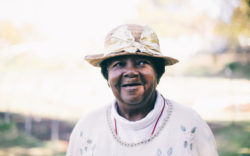A little over two years ago, Glasscrafts guitarist Steven Trimmer began to experience a terrible pain in his abdomen.
When the discomfort steadily grew worse, he knew it was time to seek help. He went to a local general practitioner, assuming diagnosis and relief would come quickly. What began instead was an ordeal that would span the next two years of his life and musical career.
At that point, Trimmer’s hair reached his shoulders, and his colorful clothing didn’t necessarily meet the standards of the business-casual working world. Waiting room procedures and paperwork revealed him to the office staff as uninsured—a fact met, he says, with pursed lips and raised eyebrows from the secretary behind the desk.
After a brief encounter with the doctor, he was shuffled back out the door with a prescription for an antibiotic. But the pain persisted. Soon, he returned to the doctor’s office, where he was met with even less attention and empathy than his original visit elicited. Dismissing his troubles as psychological, the doctor prescribed the guitarist anti-depressants and anti-anxiety medications.
Trimmer then sought the attention of a specialist. He was met by a more polite office staff but an even colder physician. “[The doctor] would not even take the time to see me or to talk to me,” says Trimmer. “He would come in, talk into a tape recorder and just leave.”
An onslaught of referrals followed, as Trimmer’s case was pushed from doctor to doctor without a diagnosis, prescription or procedure to bring him any relief. After taking several rounds of ineffective antibiotics, he grew discouraged. The pain became more acute and began relocating to different areas of his abdomen. It became increasingly difficult for him to sleep, despite the exhausting demands of his band at the time, Grass Giraffes.
Trimmer, known by friends for his positivity and enthusiasm, became irritable and anxious while he continued to look for help from specialists and clinics in both Athens and Atlanta. His funds and his patience were draining away.
“All of my money and resources went into these doctors, and no one wanted to help me,” Trimmer says. “They just put me on Xanax.”
Trimmer knew his mental and emotional issues were situational, brought on by a problem that was growing worse without any consequential answers. “It was very humiliating,” he says. “They treated me like I was crazy.”
He applied for a low-income assistance program at Athens Regional Medical Center in order to have a diagnostic surgery, and was warned that the application process might take as long as six months. Then, after eight months of waiting for the paperwork to clear, Trimmer found out his application had been lost.
Without any help in sight, and after more than a year of ongoing suffering, Trimmer didn’t know how he could continue living with the pain he was forced to tolerate day in and day out. The demand to pay his medical bills and to play music became one in the same, and Trimmer pressed on musically.
In the midst of the chaos and ongoing pain and frustration, Grass Giraffes recorded an album and began a cross-country tour. Through sheer will and dedication, Trimmer made it through most of the shows.
But then he woke up in Nashville, covered in his own blood.
He was taken to the emergency room. With the persuasion of his family, he found a surgeon willing to help. He was diagnosed, quickly and correctly. An abscess had grown in his digestive tract, and had finally torn. Trimmer needed surgery immediately. “It was at a crisis point, where I really could have died from what was going on,” he says.
After the surgery, Trimmer reapplied to the ARMC low-income program and was ultimately forgiven the hospital bill. He regained his health and vitality, but struggled with regret over the time he lost to crippling pain.
“It was just hard, because, the problem that I had, it was able to be diagnosed that quickly by someone who was just willing to take the time and talk,” he says. “And to be treated by him not like I’m crazy or insane, but just to look at me and treat me like I’m human—not just like a piece of refuse.”
Trimmer is one of innumerable Athens musicians who have faced terrible illnesses while uninsured. Elephant 6 founder Will Cullen Hart, of the Olivia Tremor Control and Circulatory System, has dealt for years with multiple sclerosis. And, like Trimmer, he doesn’t have insurance. Facing the possibility of financial collapse, Will’s wife, Kelly Hart, sought out philanthropic assistance. (Full disclosure: Kelly is a Flagpole employee, but Will is not on her insurance plan.)
After diligent searching and a tedious application process, the Harts were fortunate to find help through Pfizer Helpful Answers, MS LifeLines and The Multiple Sclerosis Association of America.
“He has two prescriptions that aren’t covered, so we pay out-of-pocket for those,” says Kelly. “We also have to pay office visits and miscellaneous stuff out-of-pocket, because he’s not insured. So, he doesn’t go to the doctor as often as he should, just because it gets expensive. But he’d hardly get any treatment at all if it weren’t for these programs that subsidize his meds.”
Will is also a part of a low-income assistance program at Athens Regional Medical Center, which the couple only learned about through a friend who was employed by the hospital. Despite significant help, Will’s medications and trips to the doctors still cost hundreds of dollars per month, and sometimes the treatment he needs is simply not an option, financially.
On one occasion, Will ended up hospitalized after tripping, hitting his head and breaking his wrist. ARMC’s low-income assistance program covered 95 percent of the cost of stitches on his forehead, X-rays and a CT scan, which would have cost approximately $5,000 otherwise. But the hospital would not put a cast on his arm, and would only refer him to an orthopedic doctor, where an appointment alone would have cost $250. Will had no choice but to let his wrist heal on its own.
For these uninsured musicians, there is potential relief on the horizon. As the doctor’s offices and hospitals of Athens shift to accommodate the students of the medical partnership between Georgia Regents University and University of Georgia (GRU/UGA), a more philanthropic spirit may prevent the horrors that Trimmer endured and the financial burden that the Harts feel daily.
The small body of GRU/UGA medical students is extending into the underserved areas of the community. The students are required to enroll in a Community Health course, in which they work with local institutions to research and design interventions addressing health related problems in the area.
Among the programs in place is a partnership with Nuçi’s Space, the nonprofit health and music resource center that provides affordable consultations with a volunteer doctor to uninsured local musicians, among other services. The Nuçi’s project was particularly attractive to eight students with an interest in the bustling local creative community, who signed up to continue a research project started by past GRU/UGA students that had been intended to characterize local musicians’ attitudes toward healthcare.
“The musician community is so different from other populations, and is not a well-understood or studied population,” says Sara Whytle, a student on the research team. “Their lifestyle is very different from other people their age. Most of the musicians we initially interviewed had a clear understanding of how to live a healthy lifestyle, and what they needed to stay healthy and out of the ER… Yet they didn’t have health insurance that would cover ER visits, and they did not think that going to a regular doctor would prevent them from having to go to the ER.”

Photo Credit: Steven Trimmer
Previous research groups had attempted to both increase musicians’ access to the Athens Nurses Clinic and promote physician participation in Nuçi’s Space’s existing program through the circulation of an educational video. Most measures of effectiveness suggested that this effort did not succeed. Thus, this year’s students were also interested in determining what an effective intervention might look like. Through a series of surveys, the students attempted to figure out what musicians felt were the greatest barriers preventing access to healthcare.
Respondents reported that they didn’t have insurance or visit doctors regularly because of the high cost. Wait times in doctors’ offices was another major concern, as was the need to schedule appointments in the seemingly distant future. The musicians reported an issue with the setting of doctors’ offices, and a preference that services be offered in a comfortable, accessible environment. They didn’t perceive many medical services to be worthy of their time and money. The musicians also indicated that they made most of their choices regarding healthcare only after seeking the advice of friends, family and the Internet. The medical students determined that, because of these factors, most local musicians ultimately give little attention to preventative healthcare.
“There may also be some differences in the way the musician community views ‘health’,” said Joseph Vinson, another medical student involved in the project. “More of an emphasis on psychological health and freedom from work-limiting illness, for example, than having low blood pressure readings or abstaining from tobacco use.”
Aside from the lack of health insurance, Whytle says, many musicians were unaware of the cheap and free healthcare options available to them. “I did find that a lot of musicians knew Nuçi’s Space and what they offered,” he says, “but they did not know about the new health partnership Nuçi’s Space had with the Athens Nurses Clinic, which allows Nuçi’s doctors to host clinic hours for musicians.”
The Affordable Care Act may provide answers for many musicians who will, in theory, have access to more cost-effective healthcare through insurance exchanges (which will be set up by the federal government in Georgia). Other new policies provide that access to healthcare must be provided regardless of pre-existing conditions. Young musicians can remain on their parents’ healthcare plans until they are 26. Musicians who can demonstrate being below a certain income level may qualify for government subsidies to afford insurance, and insurance companies must cover what are deemed “essential services.”
But the wheels of change are slow moving, particularly in a state that is opposed to the federal program. It is likely that Georgia will be short-staffed for the task of enrolling uninsured residents once the insurance exchanges open in October of this year. With 1.9 million Georgia citizens uninsured, 4,000 people would have to be enrolled daily in order for everyone to gain coverage in the first enrollment period.
And the success of the exchanges hinges on widespread enrollment. Without a large pool of consumers, the insurance companies will not be able to provide affordable insurance premiums, leaving musicians in precisely the predicament they are in now.
There are still other potential answers. Athens Health Network is a nonprofit that will provide low cost healthcare options for the uninsured and underinsured in Athens-Clarke County; it hopes to begin enrollment in spring of 2014. Modeled after the highly successful Access to Healthcare Network in Reno, NV, the program will essentially function like Costco or Sam’s Club—members pay a low monthly rate to receive health services at a substantially discounted price.
AHN is composed of multiple stakeholders in the local healthcare community, including medical providers and resource agents. The network aims to connect these entities and supply them with the resources and information needed to succeed as a public healthcare system. In its preparatory phase, the organization is working to identify what the gaps in healthcare service are and how they can fill them.
For this reason, AHN Executive Director Allie Chambers has taken an interest in the musician community in Athens. Chambers was peripherally involved with the research performed at Nuçi’s Space, and she helped form the survey and questions for the focus groups.
“Athens musicians are especially a target population,” Chambers says. “They have an ability to pay something for their care, and just need a system to access care that meets their need and income level.”
She hopes that AHN will be that system. By functioning on a “shared responsibility model,” doctors and hospitals will benefit by getting at least some money up front, rather than requiring the time and staff to deal with the paperwork involved in traditional billing and collections. Musicians like Trimmer and Hart will, of course, benefit from receiving affordable care and being able to stay out of overburdened emergency rooms.
For now, many in Athens’ storied music community continue to suffer. Although the cliché of the starving artist may be a romantic idea, the reality is continually bleak for these musicians who cannot find the resources necessary to dedicate themselves to both their health and their careers. Above all, even here, there remains a stigma against many of those whose music enriches our culture.
“I really got the runaround when I was looking for help,” says Trimmer. “When you don’t have insurance, you’re looked at very differently, and treated very differently.”
Like what you just read? Support Flagpole by making a donation today. Every dollar you give helps fund our ongoing mission to provide Athens with quality, independent journalism.









